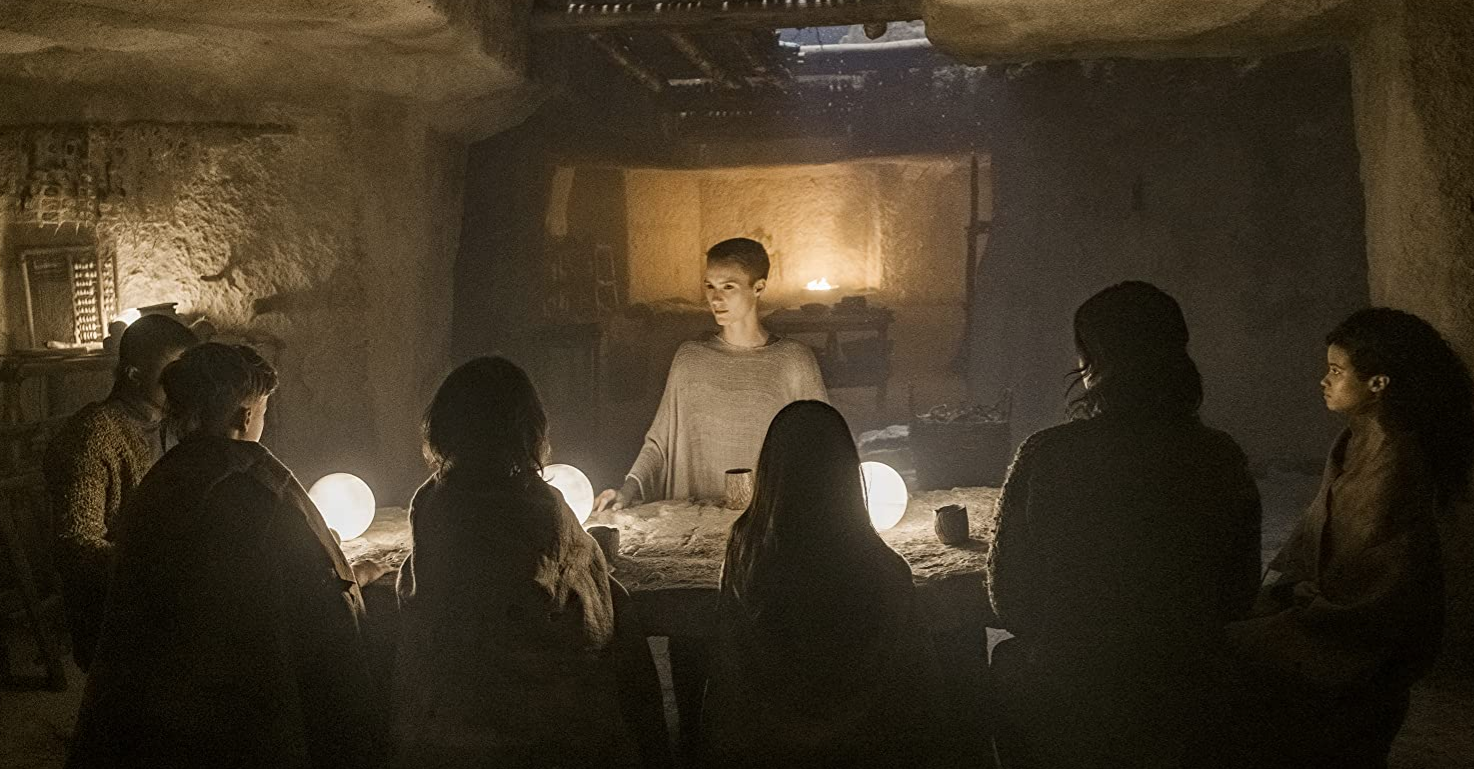by Tony Ruggio
 "Mother" and her children
"Mother" and her children
Raised by Wolves is Ridley Scott’s answer to those who didn’t take to Prometheus, his magnum opus follow-up to Alien decades later. The powers that be got in the way of his true passion and led to a compromised vision once Alien Covenant came along. This is clearly an opportunity for him to revisit such themes as religion, man’s origin, and artificial intelligence, as well as delve into his slower, more methodical aesthetic preferences in greater detail. The first three episodes introduce us to a future wherein a great war has been fought (or is still being fought? It’s unclear) between atheists and a religious faction known as the Mithraic, spiritual fundamentalists devoted to a sun god called Sol.
The story begins on a planet distant from Earth where an atheist group has sent two androids with the mission of shepherding a successful human colony there. So far, Wolves is primarily interested in the evolving behaviors of these androids, known only as Mother (Amanda Collin) and Father (Abubukar Salim)...
 "Father" (Abubakar Salim)
"Father" (Abubakar Salim)
Together they raise a number of human children, a number that quickly dwindles over the years as an arid environment (or something else) takes its toll on their ability to thrive and flourish. Campion, a child who nearly came into this world stillborn, is called “special” and begins to question the competence and stability of his robot parents, particularly once he meets other humans traveling from across the galaxy.
Similar to Prometheus and Covenant, the most fascinating part of Wolves revolves around the two androids. The human characters such as Campion and a pair of impostors (Travis Fimmel, Niamh Algar) hold promise, but are not yet as attention-grabbing or as interesting as the intricacies of Mother and Father and how they interact with the world. Mother is a more fierce personality, harboring secrets and a dark side that forces Campion to reconsider whether his place should actually be with the humans. Father is the heart and soul of the series (from what we can tell thus far). Though the humans think they are merely pretending, Father is an android who projects heroism and a caretaker’s love when it comes to protecting his children and monitoring Mother’s potentially unstable behavior.
Their life on this planet is a difficult slog through harsh weather, mysterious radiation, and alien predators, and the rolling thunder of unforgiving scenarios seems to trigger an alternate set of programming in Mother, a more violent and vigorous set of ideals based on her former status as a “Necromancer.” We don’t know what this means exactly, but we can assume it’s not good for the colony. It’s good for the show though, as one scene aboard a giant ship called an Ark has Mother decimating the entire crew with her eyes, or is it her scream? That part is unclear as well. Either way, like a bloodier Dark Phoenix, she is capable of looking at a fleshy person and causing them to spontaneously combust into nothing but red innards.
 The massacre
The massacre
She walks through the ship, through the gutsy debris as a human wanders through mist, and it’s a visual feast if you can stomach the not-subtle gore. This sequence cements Raised by Wolves as one of the most cinematic shows on television, moreso then what you'll see on Netflix or Hulu or even Amazon. That’s what HBO does best, they make movies out of television. They’re the pinnacle of what people think of when they say movies are becoming like television and television is becoming like movies.
What Ridley Scott does best is conjure up an epic, foggy atmosphere of dread, as well as attempt to address our age-old questions surrounding religion and the dawn of man. While the show has yet to dive into the deep end of such ruminations, the stage is certainly set with the backdrop of a war between believers and non-believers, and a planet where androids are tasked with starting life as if they were caretakers for an arid Garden of Eden. Wolves somehow manages to awe and inspire with its cinematography in spite of grey colors and desaturated landscapes. It’s a feat of world-building that feels specific to Scott’s abilities, and that’s really what these first three episodes succeed at doing: introducing us to a world that feels incredibly real and tangible despite being so unmistakably alien. Much like the androids themselves.
more sci-fi
more from Tony Ruggio